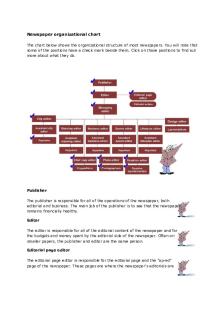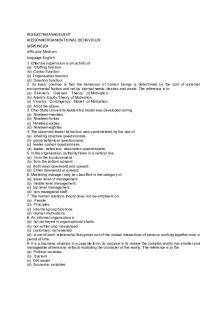Intercultural Organisational Management – 8 PDF

| Title | Intercultural Organisational Management – 8 |
|---|---|
| Author | Megan Crawford |
| Course | Intercultural Organisational Management |
| Institution | Edinburgh Napier University |
| Pages | 5 |
| File Size | 269.6 KB |
| File Type | |
| Total Downloads | 67 |
| Total Views | 155 |
Summary
IOM...
Description
Intercultural Organisational Management – 8/11/16 Lecture Language -
6909 according to the Lingustic society of Amercia All show tremendous diversity in structure Finnish – have very complex ways of making compoite words Mandarin Chinese has simple, short words that do not vary
Integration with culture: Two concepts of use here: Ethnography of communication Contrastice Rhetoric Ethnography of Communicaiton: Sees languages as being integrated with, and also fundmental to, culture . Originally from the work of Hymes and summarised more recently here – it considers language as ‘the socially situated used and meanings of words, their relaitons, and sequential forms of expression’ Carbaugh 2013 So? Well – for example, in japan where formality and hierarchy are often key there are a number of words for ‘please’ Ku: Kudasai, Onegaishimasu, Onegaimoshaggimasu - all depending on the level of culture used Also, remember that ‘yes’ may simply mean ‘I hear you’ There are therefore a number of elements whereby the language is reflective of and intergral to the culture
Contrastive Rhetoric Here’s another one:
Contrastive Rheoric: Whilst this has been critiqued in a similar way to how the large culture approach has been critiqued – i.e. that it may reflect ad reproduct stereotypes, and that it tends to look at issues from a western perspective – it is nevertheless useful as a starting point for reflection and comparision How? Well, think of a business report from the ‘west’ and from ‘china’ – and how it may be perceived differently Translation: Untranslatable words- - on one hand things can be translated partially or inaccuralty, on the other hand some things are hard to translate at all, because closely linked to culture they are embedded in : http://blog.maptia.com/posts/untranslatable-words-from-other-cultures Context:
Translation: context
It should say, disposable goods. Why doesn’t it? – Many different meanings for the words If you don’t have the correct context of what the words need to appear in this can make translation extremely hard Translation is complex, what can go wrong is categorised into 5 areas: Lexical = dictionary, word for word Semantic = what the words actually mean Idiom= where the words as a whole mean something different from their meanings individuallu e.g. ‘Its baltic’ used often in Scotland to desctibe temp Grammatical – syntactic = related to word order and sentence construction
Experiential equivalence = Usunier notes the most difficult translation is to reach experimental equivalence, “to reconstruct s ource based experiemental meaning in the target language”
International English Careless writing in UK: Used cars:
Why go elsewhere to be cheated? Come here first!
Auto repair service: Free pick-up and delivery. Try us once, you'll never go anywhere again. Dinner special:
Turkey 2.35, chicken or beef 2.25, children 2.00.
Beauty salon:
Now is your chance to get your ears pierced and take home an extra pair, too. http://www.ideels.uni-bremen.de/what_they_said.html
ELF – English as the Lingua Franca - People develop their own way of using English - Non native speakers can feel more comfortable communication with non native speakers The language barrier: between - Harzing and feely talk about the language barrier with its effect in management and they talk about multiple language barriers created as a result of differenet languages - These barriers can affect the way business is done by creating blocks between groups, especially in large companies - Clearly these barriers are in existence for many of the reasons above – translation, international English, the need for contex t - Harzing and feely talk about barriers between languages being different but it is also the case that barriers may exist in the same language Words - Borges wrote that “words are symbols with an assumed shared memory” - These assumptions however can differ greatly - Same, language, different jobs, words mean different things
For example? n n
The word Describe – from an engineering perspective: if I say ‘describe the so , my lawyer sister would say well it’s wet and muddy and grey or brown or maybe white if it’s a China cla , but to actually get an engineer’s ‘description’ of soil requires certain tests, requires certain calculations and you plot that on the chart and that gives you you description (cited in Richards and Pilcher 2016).
-
Also – with the word ‘empathy’ n
n
“ think within Nursing we would see ‘empathy’ as a professional quality and a skill…something tha could be learnt…that you have to employ that as part of your work and is very core and maybe again that’s very differen in other disciplines” empathy’ within Design is usually…with the idea of having some sort of resolution a the end of it…and yet, there may be no resolution in especially Nursing…it might be more to do with merely being willing to understand and listen.” (cited in Pilcher and Richards, 2016).
So the barrier can exist in the language itself aswell - Ultimatly, language is arguably not something that can be cut away and assumed to have a set meaning, but instead needs to be seen in context of its use - One more element here which is useful to consider but wit the emphasis on the word hypothesis Language and thought: Sapir whorf hypothesis The way in which we see and think about the world around us is to a very large extent determined by the language habits of our community - The way we see things influences how we speak about things – the words we use - As Vygotsky wrote ‘the meaning of a word represents such a close amalam of though and language that it is hard to tell whether it is a phenomenon of speech of a phenomenon of though - Sapir Whorf has been much critiqued – being reffered to as one of the biggest con men ever - Can you determine which comes first? The thoughts or words
-
Deutscher argues provides ability to express things rather than determines the way people think – Whorf persists...
Similar Free PDFs

Comunicación intercultural
- 21 Pages

Organisational structure
- 3 Pages

Organisational Communication
- 3 Pages

Organisational feasibility
- 2 Pages

Negociacion Intercultural
- 19 Pages

Organisational Behaviour
- 26 Pages

Organisational behaviour
- 1 Pages

Organisational Rights
- 4 Pages

Intercultural relationship paper
- 5 Pages

INTERCULTURAL COMMUNICATION in Contexts
- 560 Pages
Popular Institutions
- Tinajero National High School - Annex
- Politeknik Caltex Riau
- Yokohama City University
- SGT University
- University of Al-Qadisiyah
- Divine Word College of Vigan
- Techniek College Rotterdam
- Universidade de Santiago
- Universiti Teknologi MARA Cawangan Johor Kampus Pasir Gudang
- Poltekkes Kemenkes Yogyakarta
- Baguio City National High School
- Colegio san marcos
- preparatoria uno
- Centro de Bachillerato Tecnológico Industrial y de Servicios No. 107
- Dalian Maritime University
- Quang Trung Secondary School
- Colegio Tecnológico en Informática
- Corporación Regional de Educación Superior
- Grupo CEDVA
- Dar Al Uloom University
- Centro de Estudios Preuniversitarios de la Universidad Nacional de Ingeniería
- 上智大学
- Aakash International School, Nuna Majara
- San Felipe Neri Catholic School
- Kang Chiao International School - New Taipei City
- Misamis Occidental National High School
- Institución Educativa Escuela Normal Juan Ladrilleros
- Kolehiyo ng Pantukan
- Batanes State College
- Instituto Continental
- Sekolah Menengah Kejuruan Kesehatan Kaltara (Tarakan)
- Colegio de La Inmaculada Concepcion - Cebu





